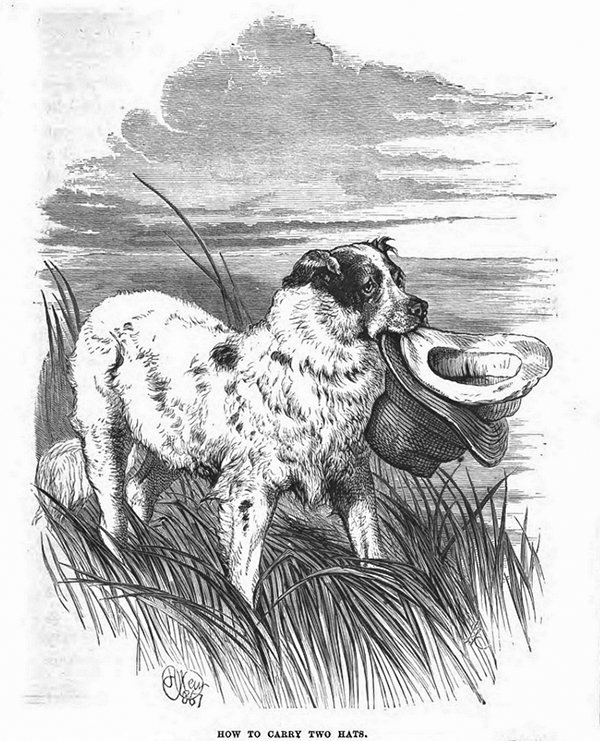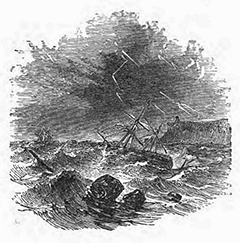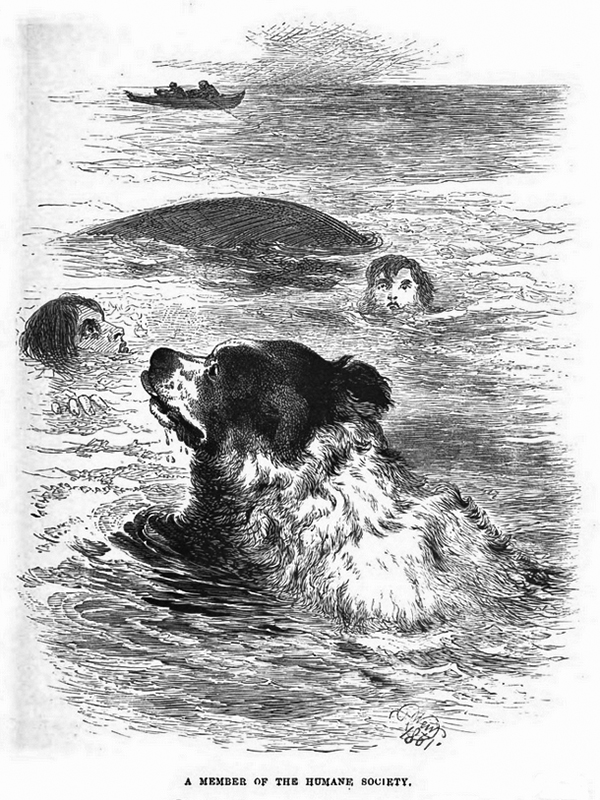[ Hibberd / Clever Dogs, Horses, etc. ]
(James) Shirley Hibberd (1825 - 1890), who routinely published w/o using his first name, was a hugely popular and prolific writer on gardening and horticulture in the 19th Century, and edited several gardening magazines (one of which, Amateur Gardening, continues to this day). He also wrote on various natural history topics, vegetarianism, animal cruelty, bee- and aquarium keeping, and conservation — a man ahead of his time, in many respects.
Clever Dogs, Horses, etc. with Anecdotes of Other Animals was first published in 1868 (London: S. W. Partridge) and reprinted the following year. Most of the illustrations in this work, including the large Newfoundland dog image below, were by Harrison Weir (1824 - 1906), the noted English animal illustrator who, according to his Wiki entry, is also known as "the Father of the Cat Fancy" for organizing the very first cat show in England in 1871.
There are several Newf-related anecdotes
One of the simplest but most unmistakable examples of dog-reason I can call to mind amongst hundreds of such that might be woven into our scheme, is that of a Newfoundland dog sent across a stream to fetch a couple of hats, while his master and a friend had gone on some distance. The dog went after them, and they saw him attempt to carry both, and fail; for the two were too much for him. Presently he paused in his endeavour, took a careful survey of the hats, discovered that one was larger than the other, put the small one inside the larger, took the larger in his teeth by the brim, and swam away, the happy carrier of the burden appointed him. (22)

The next Newf-related anecdote is "The Dog and the Pocket-book":
Of all the different kinds of dogs, the Newfoundland seems to possess the most sense and the strongest attachment. An extraordinary instance of both, Bewick, in his "History of Quadrupeds," relates, in the following words: "During a severe storm, in the winter of 1789, a ship, belonging to Newcastle was lost near Yarmouth, and a Newfoundland Dog alone escaped to shore, bringing in his mouth the captain's pocket-book. He landed amidst a number of people, several of whom in vain endeavoured to take it from him. The sagacious animal, as if sensible of the importance of the charge, which in all probability, was delivered to him by his perishing master, at length leapt fawningly against the breast of a man, who had attracted his notice among the crowd, and delivered the book to him. The dog immediately returned to the place where he had landed, and watched with great attention for every thing that came from the wrecked vessel, seizing them, and endeavouring to bring them to land." (54 - 55)
 ( uncredited image )
( uncredited image )
The final Newf-related anecdote:
MR. THOMAS MACKAILL happened one day, in the year 1812, to be walking along the banks of the Thames, nearly opposite the Penitentiary at Millbank, when a wherry upset, with two men on board. A gentleman happened to pass at the same time, accompanied by a fine Newfoundland dog; but as he did not at first observe the accident, he was surprised at his attendant making a sudden leap into the river. He soon discovered that he was making all possible speed for the unfortunate men, one of whom could not swim, and was using violent efforts to sustain himself; the dog seized him first, as seeming to stand most in need of his assistance, and brought him safely to the shore, and returned to the other, and brought him also, in the presence of at least a hundred spectators.
Curiously, Weir's illustration for this anecdote is dated 1861, although 1868 was this book's first publication. I imagine it appeared in some prior work.



